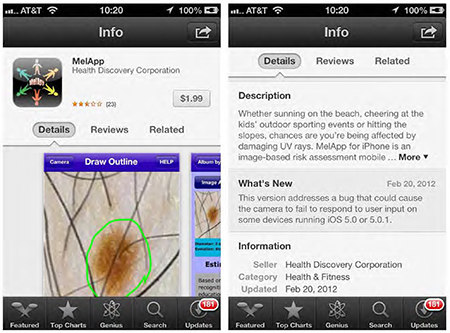Can a smartphone app diagnose melanoma?
Melanoma is one of the most dangerous malignant tumors, it is localized on the skin or mucous membranes and is able to metastasize to almost all organs. Her late diagnosis leads to dire consequences. Therefore, the US Federal Chamber of Commerce has fined the developers of two applications that, as claimed by the advertising, diagnose melanoma even in its early stages.
MelApp app

People trust smartphone apps more than they need, even when it comes to health. This is used by the developers. And if an incorrect counting of calories is unlikely to lead to the hospital, then an incorrect diagnosis of skin cancer can have very sad consequences for the user.
The MelApp and Mole Detective ad contains a statement that these mobile apps are able to detect the symptoms of melanoma in the early stages. To do this, you need to take a photo of the problem area of the skin, after which the service analyzes the image and gives an answer about the degree of risk of melanoma - low, medium or high.
')
In 2013, scientists tested six applications that determine melanoma. Two applications were dropped immediately, as they needed to take new photos. Using the remaining four applications, scientists tested sixty photographs of melanomas and one hundred twenty-eight with benign tumors.
One application launched an automated analysis algorithm, another asked to determine the edges of the lesion, and the third offered for money to send this photo to a living doctor, who would later send a diagnosis. What is the accuracy of the diagnosis? The best application made the correct diagnosis in thirty-six percent of cases. The doctor was not mistaken at forty-two.
The main reason for concern is the wrong result: thirty percent of malignant tumors, automated applications were defined as benign tumors, thus they calm the users, but they do not go to the doctor.

The Federal Chamber of Commerce financed MelApp developers for $ 17,963 and Mole Detective for $ 3,930, and prohibited them from using language that misleads users in advertising: namely, claims that the application can detect melanoma in its early stages.
MelApp app

People trust smartphone apps more than they need, even when it comes to health. This is used by the developers. And if an incorrect counting of calories is unlikely to lead to the hospital, then an incorrect diagnosis of skin cancer can have very sad consequences for the user.
How do these applications work?
The MelApp and Mole Detective ad contains a statement that these mobile apps are able to detect the symptoms of melanoma in the early stages. To do this, you need to take a photo of the problem area of the skin, after which the service analyzes the image and gives an answer about the degree of risk of melanoma - low, medium or high.
')
How accurate is the diagnosis?
In 2013, scientists tested six applications that determine melanoma. Two applications were dropped immediately, as they needed to take new photos. Using the remaining four applications, scientists tested sixty photographs of melanomas and one hundred twenty-eight with benign tumors.
One application launched an automated analysis algorithm, another asked to determine the edges of the lesion, and the third offered for money to send this photo to a living doctor, who would later send a diagnosis. What is the accuracy of the diagnosis? The best application made the correct diagnosis in thirty-six percent of cases. The doctor was not mistaken at forty-two.
The main reason for concern is the wrong result: thirty percent of malignant tumors, automated applications were defined as benign tumors, thus they calm the users, but they do not go to the doctor.

The Federal Chamber of Commerce financed MelApp developers for $ 17,963 and Mole Detective for $ 3,930, and prohibited them from using language that misleads users in advertising: namely, claims that the application can detect melanoma in its early stages.
Source: https://habr.com/ru/post/376851/
All Articles